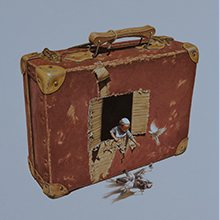
El socialismo del proletariado está en crisis, al igual que el capitalismo y viceversa. Los malos y los buenos se confunden, las alianzas se mezclan y muchos son los que se sienten traicionados por la historia, la política, las ilusiones, las economías, las ideologías. En ese pasado (y presente), el apologético “más vale solo que mal acompañado” o “orgullosamente solo” ha sido una vía de escape para varios regímenes. Sin embargo, porque siempre hay un pero, el Humor resulta ser esa espina clavada en el talón de Aquiles de cualquier gobernante y si unos hacen de todo por arrancarlo y pisotearlo, otros, en paralelo, lo utilizan como arma de panfleto, de aliado en su campaña de promoción, subvencionando revistas en papel de alta calidad y técnicas de impresión, como lo han hecho varias dictaduras. Esto no significa libertad de prensa, ni libertad de pensamiento, sino que sigue siendo un humor vivo, por muy premeditado e impulsado que sea.
Hay países que, a pesar de ser cercanos geográficamente, nos resultan «exóticos», ya sea por su historia o por su cultura. Albania es una de ellas: antes no era ni europea ni oriental, es decir, ni occidental ni soviética, era maoísta en tierras mediterráneas. Ahora, a pesar de ser Europa, es más «medio-oriente» con su cultura predominantemente musulmana. Para comprender mejor sus humores, hablamos con el famoso caricaturista albanés Agim Sulaj.
«Albania estuvo bajo el Imperio Otomano durante 500 años, lo que significa que aún hoy la cultura, la mentalidad y la religión (musulmana) turcas son predominantes en la forma de pensar y vivir. Sin embargo, también está la presencia del cristianismo, ya sea ortodoxo o católico, todos los cuales fueron prohibidos durante el régimen comunista (1941-1991). Ahora, Albania está llena de mezquitas turcas, campanarios católicos e iglesias ortodoxas donde la gente vive en paz, sin problemas de fundamentalismo».
Pero, ¿cómo caracteriza el humor albanés? «El humor en Albania, durante mi infancia y adolescencia, era el humor censurado, la sonrisa limitada por el régimen. Todo estaba controlado por el sistema, que era una sombra oscura sobre el alma y los sentimientos de un pueblo que, junto al humor oficial, mantenía su humor popular, ancestral».
Es curiosa esta forma de mantener el humor, en la que brilló el diario «Hosteni» (Ferrão), una publicación de lujo, en papel, iniciada en 1954, donde trabajaron los artistas albaneses más reconocidos internacionalmente, como es el caso de Zef Bumci, Bardhyl Fico, Petrit Konci, Dhimiter Ligori, Shtjefen Palushi, Ilir Pojani, Korta Raka, Shemedin Ruci, Agim Sulaj… Era un periódico que no criticaba al partido, que no cuestionaba la ideología, sino que satirizaba los males del sistema. Se suponía que la función de la caricatura era moralizante. Sin pasarse de la raya, la libertad de espíritu de estos humoristas albaneses en la crítica y el humor era asombrosa, estando atentos a las imperfecciones del sistema, como la burocracia; la falta de entusiasmo de algunos albaneses por participar en el esfuerzo de producción; críticas a la industria que no se moderniza; a la agricultura que no produce; errores de planificación; mala calidad de los servicios y equipos; la crítica del individualismo, el irrealismo, la ambición y el egoísmo. Por lo tanto, hubo una crítica social y económica, nunca política.
Para un extranjero, esta revista es un panorama de los problemas del sistema, de las dificultades cotidianas de la sociedad, de las tortuosidades del régimen. Es por tanto una crítica social y económica, nunca política.
Luego encontramos el humorismo oficial de las palabras de moda, que es el humor en la política internacional. Entonces la agresividad es grande contra el mundo capitalista. El universo de vampiros, conspiradores, usureros… en definitiva, los malvados. No perdonan ni a los Estados Unidos de América ni a la Unión Soviética, los tiburones del planeta, pero no acatan a China que los protege.
«Sí, y también trabajé en "Hosteni" donde todos los artículos o dibujos tenían que ser juzgados por el consejo de redacción, después de lo cual eran aprobados por el Comité del Partido Comunista. La libertad de expresión era cero, pero extrañamente mis compañeros y yo nos reíamos mucho, la vida era simple y cruda y el cuerpo y el alma necesitaban reír, hacer humor natural sin censura, explorar juegos de palabras, bromear con la gente de compras, reacciones a un partido de fútbol, amantes... Mi fuente de inspiración fue la vida, los barrios sencillos y pobres de Tirana, el humor de mi abuelo y los chistes de mi abuela, que eran sanos y divertidos, llenos de filosofía y humor. Las risas con amigos del colegio o de la Academia de las Artes eran espontáneas y bonitas».
Y hoy, ¿cómo es? “Ahora hay libertad de expresión, la gente habla libremente y puede criticar o satirizar en todos los géneros de las artes. Curiosamente, sin embargo, la caricatura ya no tiene la misma fuerza que tuvo durante el régimen, quizás porque la generación de caricaturistas que tuvo mucho éxito en Albania a partir de 1990 abandonó el país. Yo era uno de ellos, viviendo en Italia donde puedo dibujar, pintar... Aquí, tuve la libertad de criticar y pensar más profundamente sobre mi vida. Uno de los íconos de expresión de mis pensamientos es la maleta, con poca ropa y muchos sueños.
Los caricaturistas que quedaron en Albania se perdieron, ya que tras la caída del régimen desapareció la revista "Hosteni" y no existe ninguna publicación humorística. Los periódicos de noticias lo publican, de vez en cuando, pero sin mucho apoyo. Lamentablemente ya no es un humor crítico, sino un poco más vulgar.
Lo mismo sucede en la televisión. Tenemos buenos comediantes en la televisión y en el teatro donde los dramaturgos tratan de mantener su alma humorística, así como los escritores tratan de publicar sus libros humorísticos. Una cosa es cierta el humor subsiste y está vivo».
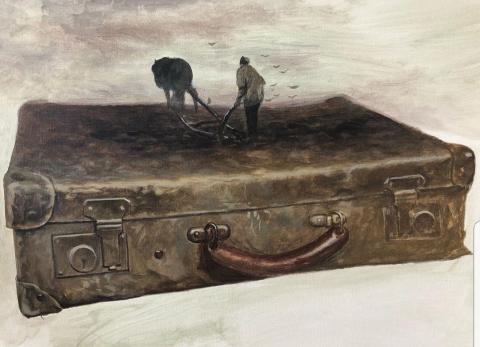
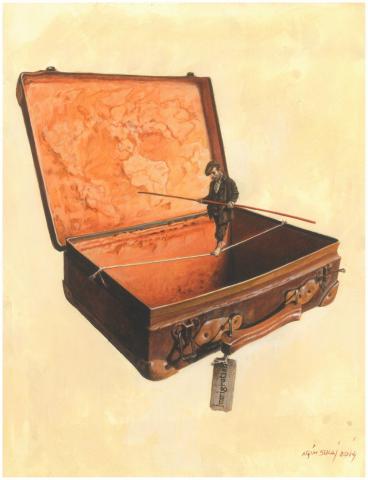
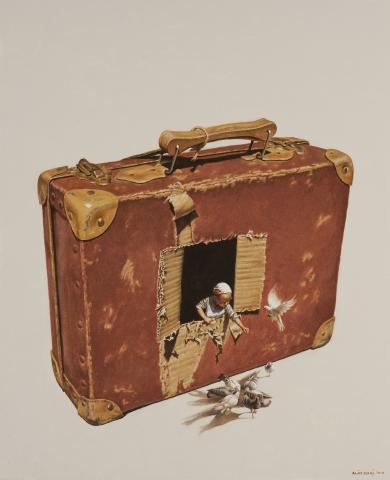
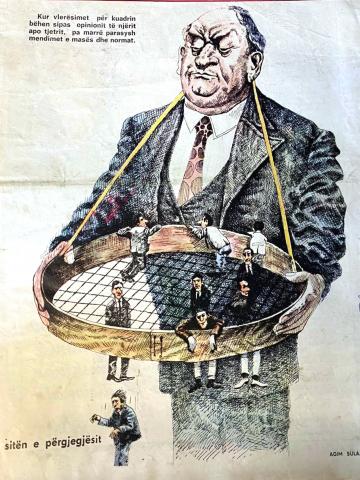
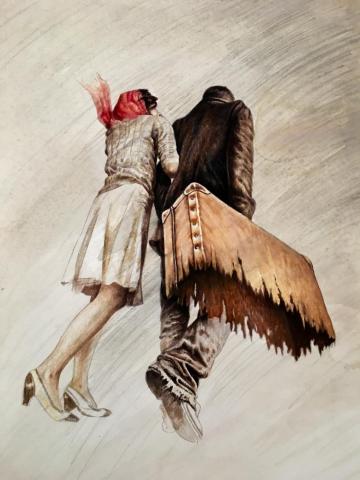
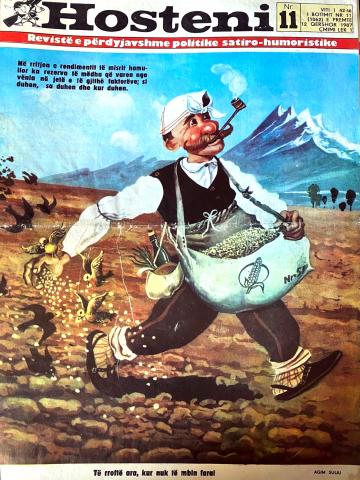
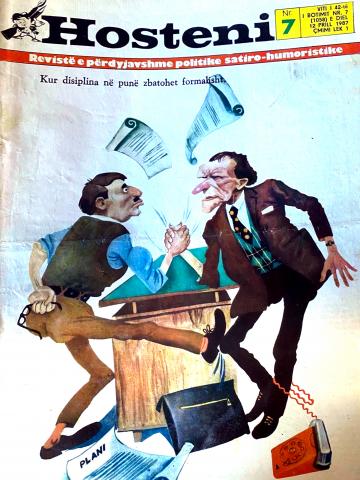
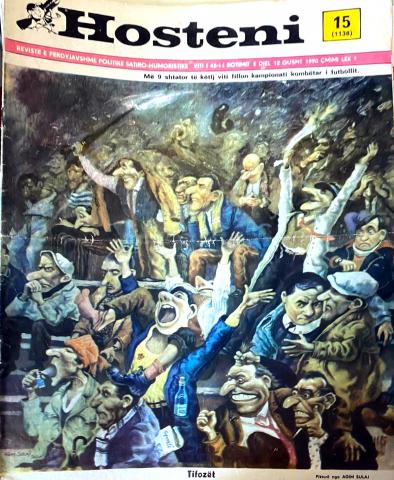
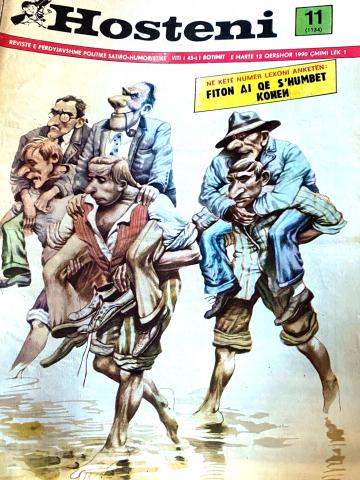
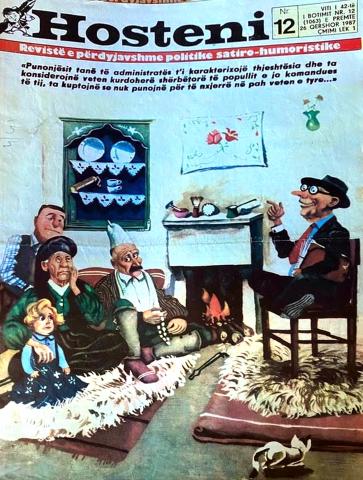
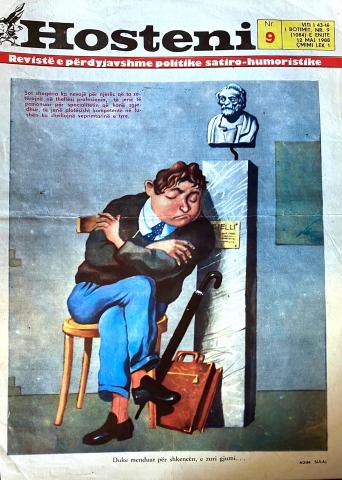
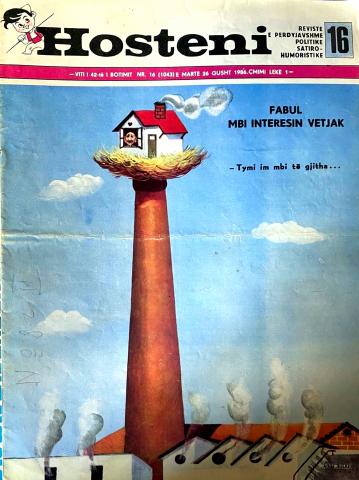
The socialism of the proletariat is in crisis, just like capitalism and vice versa. The bad and the good are confused, the alliances are mixed and there are many who feel betrayed by history, politics, illusions, economies, ideologies. In that past (and present), the apologetic "better alone than in bad company" or "proudly alone" has been an escape route for various regimes. However, because there is always a but, Humor turns out to be that thorn in the Achilles heel of any ruler and if some do everything to tear it out and trample it, others, in parallel, use it as a weapon for a pamphlet, as an ally in its promotional campaign, subsidizing magazines on high-quality paper and printing techniques, as various dictatorships have done. This does not mean freedom of the press, nor freedom of thought, but it is still live humor, no matter how premeditated and driven.
There are countries that, despite being geographically close, are "exotic" to us, either because of their history or their culture. Albania is one of them: before it was neither European nor Eastern, that is, neither Western nor Soviet, it was Maoist in Mediterranean lands. Now, despite being Europe, it is more "Middle Eastern" with its predominantly Muslim culture. To better understand his moods, we spoke to the famous Albanian cartoonist Agim Sulaj.
"Albania was under the Ottoman Empire for 500 years, which means that even today the Turkish (Muslim) culture, mentality and religion are predominant in the way of thinking and living. However, there is also the presence of Christianity, either Orthodox or Catholic, all of which were banned during the communist regime (1941-1991). Now, Albania is full of Turkish mosques, Catholic bell towers and Orthodox churches where people live in peace, without problems of fundamentalism."
But how do you characterize Albanian humor? «The humor in Albania, during my childhood and adolescence, was censored humor, the smile limited by the regime. Everything was controlled by the system, which was a dark shadow over the soul and feelings of a people that, together with the official humor, maintained its popular, ancestral humor.
This way of maintaining humor is curious, in which the newspaper "Hosteni" (Ferrão) shone, a luxury publication, on paper, started in 1954, where the most internationally recognized Albanian artists worked, such as Zef Bumci , Bardhyl Fico, Petrit Konci, Dhimiter Ligori, Shtjefen Palushi, Ilir Pojani, Korta Raka, Shemedin Ruci, Agim Sulaj… It was a newspaper that did not criticize the party, that did not question ideology, but satirized the evils of the system. The function of the caricature was supposed to be moralizing. Without going over the line, the freedom of spirit of these Albanian humorists in criticism and humor was amazing, being attentive to the imperfections of the system, such as bureaucracy; the lack of enthusiasm of some Albanians to participate in the production effort; criticism of the industry that does not modernize; to agriculture that does not produce; planning errors; poor quality of services and equipment; the critique of individualism, unrealism, ambition and egoism. Therefore, there was a social and economic critique, never a political one.
For a foreigner, this magazine is an overview of the problems of the system, of the daily difficulties of society, of the tortuosities of the regime. It is therefore a social and economic critique, never a political one.
Then we find the official buzzword humor, which is humor in international politics. So the aggressiveness is great against the capitalist world. The universe of vampires, conspirators, usurers... in short, the wicked. They do not forgive the United States of America or the Soviet Union, the sharks of the planet, but they do not abide by China that protects them.
«Yes, and I also worked in "Hosteni" where all the articles or drawings had to be judged by the editorial board, after which they were approved by the Committee of the Communist Party. Freedom of expression was zero, but strangely my colleagues and I laughed a lot, life was simple and raw and body and soul needed to laugh, do uncensored natural humor, explore puns, joke with people shopping, reactions to a football game, lovers... My source of inspiration was life, the simple and poor neighborhoods of Tirana, my grandfather's humor and my grandmother's jokes, which were healthy and funny, full of philosophy and humor. The laughs with friends from school or the Academy of Arts were spontaneous and beautiful ».
And today, how is it? “Now there is freedom of expression, people speak freely and can criticize or satirize in all genres of the arts. Curiously, however, cartooning is no longer as strong as it was during the regime, perhaps because the generation of cartoonists who were very successful in Albania after 1990 left the country. I was one of them, living in Italy where I can draw, paint... Here, I had the freedom to criticize and think more deeply about my life. One of the icons of expression of my thoughts is the suitcase, with few clothes and many dreams.
The cartoonists who remained in Albania were lost, since after the fall of the regime the magazine "Hosteni" disappeared and there is no humorous publication. News papers do run it, from time to time, but without much support. Unfortunately it is no longer a critical humor, but a little more vulgar.
The same thing happens on television. We have good comedians on TV and in the theater where playwrights try to keep their humorous soul, just as writers try to get their humorous books published. One thing is certain, humor subsists and is alive.
